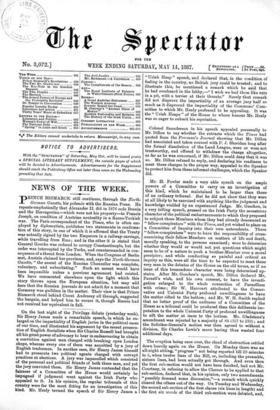Mr. H. Fowler made a very able speech on the
ample powers of a Committee to carry on an investigation of this kind, which he maintained to be larger than those of an ordinary tribunal. But he did not show that they were at all likely to be exercised with anything like the judgment and knowledge wielded by an experienced Judge. Mr. Gosthen, in a very telling speech, pressed on the Irish Party the monstrous character of the political embarrassments to which they proposed to subject those Members whom they had already denounced as "fellow-conspirators" with the Times, and yet wished to place on a Committee of Inquiry into their own antecedents. These " fellow-conspirators " were to have the responsibility of cross- examining their fellow-Members on matters of life and death, morally speaking, to the persons examined; were to determine whether they would or would not put questions which might seem to be of a nature to push a brother-Member over a moral precipice; and while conducting so painful and critical an inquiry as this, were all the time to be expected to meet these very men in the debates of the House on the old terms, as if no issue of this tremendous character were being determined up- stairs. After Mr. Goschen's speech, Mr. Dillon declared Mr. Parnell's wish, and his own consent, to have the investi- gation enlarged to the whole connection of Parnellism with crime ; Sir W. Harcourt attributed to the Conser- vative and Unionist Party profound unwillingness to have the matter sifted to the bottom ; and Mr. W. H. Smith replied that no better proof of the unfitness of a Committee of the House as a tribunal could be produced than this deliberate im- putation to the whole Unionist Party of profound unwillingness to sift the matter at issue to the bottom. Mr. Gladstone's amendment was rejected by a majority of 84 (317 to 233) ; and the Solicitor-General's motion was then agreed to without a division, Sir Charles Lewis's move having thus wasted four additional days.


































